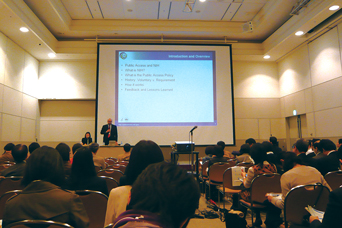Takao Namiki
(Associate Professor, Department of Mathematics / Research Center for Integrative Mathematics, Hokkaido University)
Introduction
On September 8–9, a Workshop of the Kyoto University Research Institute for Mathematical Sciences (RIMS) was held jointly with the 3rd SPARC Japan Seminar. As one of the joint research programs in national joint-use research facilities, RIMS holds a series of Workshops for which topic proposals are invited. Several dozen are accepted each year, and the program contributes enormously to the advancement of mathematics research in Japan. The Workshop records, held in Kyoto University’s institutional repository, are utilized by mathematicians all over the world.
I organized three RIMS Workshops between 2006 and 2008 under the title “Digitization of Mathematical Journals and Related Topics.” This year, I convened a session titled “Towards a Digital Mathematics Library in Japan,” held jointly with the 3rd SPARC Japan Seminar.
The co-sponsorship of the Kyoto University Library Network enabled us to meet in the Library Hall at the Kyoto University Library, and thus to receive the kind assistance of the staff of the Information Management Division. The attendance of just under 60 was well above average. About 10 to 15 of those present were mathematicians and 20 to 30 librarians. The high figure may be accounted for by the fact that, on September 7, many participants had also attended the DRF Technical Workshop, co-sponsored by the Digital Repository Federation (DRF) and the National Institute for Materials Science (NIMS).
Summary (Note: Speakers’ titles omitted.)
In the afternoon-only program on September 8, Kazuhiko Aso of the Graduate School of Mathematical Sciences, University of Tokyo, described how he came to discover audio tapes of lectures given at the “Tokyo-Nikko Symposium” (the 1955 international conference that paved the way for solution of Fermat’s Last Theorem, which had gone unsolved for 300 years), and also discussed digitization of the tapes—a topic of global import. Akiko Nishimura of the Kyoto University Library, focusing mainly on the mathematics literature, reported on a project to issue the university’s bulletins and other periodicals in electronic format, centered on the institutional repository. Such repositories play a large role where mathematical journals are concerned, as publication in this field is largely sustained by very small-scale university bulletins. Sho Sato of the University of Tsukuba reported on trends in access log analyses in different fields at institutional repositories, describing their effectiveness in regard to PDFs with embedded text.
On September 9, in the morning Masao Takaku of NIMS and Malte Dreyer of the Max Planck Digital Library talked about eSciDoc, which is under development as a subject repository in materials science; they discussed its status in Japan and Germany and its potential contribution to eScience. Although materials science may not be directly relevant to mathematics, the two fields have much in common regarding subject repositories.
The afternoon program focused on mathematics. I presented an outline of mathematical journals in Japan and reported on Japan’s Digital Mathematics Library (DML-JP), created with the support of SPARC Japan. If one excludes the United States as a special case, DML-JP is the largest such library after its German and French counterparts. Together with Project Euclid (see below), it clearly demonstrates the role that digital repositories, and especially institutional repositories, can play. Keisuke Yokoi of the University of Tokyo presented the latest work on similarity searches for mathematical expressions using MathML content markup. Mathematical expression searches have uses beyond mathematics and they are expected to be widely utilized. Masakazu Suzuki of Kyushu University’s Graduate School and Faculty of Mathematics reported on the adaptive method for digitization of mathematical journals. Searches for mathematical expressions are another area where it is essential that scanned images of printed papers should be correctly marked up, and it is essential to develop advanced OCR technology that can handle mathematical expressions. Mira Waller of Duke University Press and David Ruddy of Project Euclid, Cornell University, outlined Project Euclid, the platform for e-journals in mathematics and statistics which supports SPARC Japan’s mathematical partner journals. Project Euclid plays a major role in Japan by carrying the nation’s leading mathematical journals.
Conclusion
The situation has changed greatly in the four years that I have been convening RIMS Workshops. Where four years ago the only general-purpose platform available was J-STAGE, there are now almost 80 institutional repositories. Though the debate continues, the mere fact of having a choice of platforms suggests that we are now living in a very different era. Readers are invited to consult the lecture materials from this Workshop on the SPARC Japan website.


6th SPARC Japan Seminar 2009
 |
Wed., Nov. 11, 2009, 15:30–17:00, Pacifico Yokohama
Attendance: 103
|
The Seminar was held as part of the Library Fair & Forum.
The question of how to realize open access to research results still poses a number of problems, and many nations are conducting government-level studies with a view to making the results of taxpayer-funded research openly accessible.
In the United States, the National Institutes of Health (NIH) have an institutional policy of “public access” as distinct from “open access.” To protect the health of the American people, since April 2008, the NIH has required scientists to submit research results that arise from NIH funds to the digital archive PubMed Central.
At the seminar, Dr. Neil M. Thakur, Special Assistant to the NIH Deputy Director for Extramural Research, was invited to speak about the NIH Public Access Policy, including the historical background to the requirement, the method of submission of papers, and copyright matters. The lecture was followed by a lively Q&A session.
Questionnaires returned by participants included the comments “It was very useful to hear the policy explained in detail,” and “I gained a clear understanding of the basis of the PubMed system.” |
|

